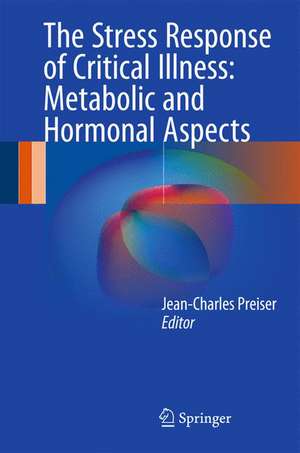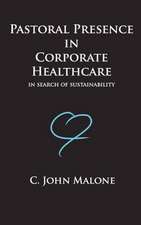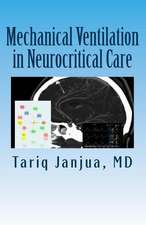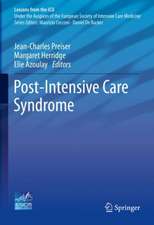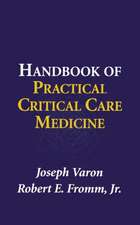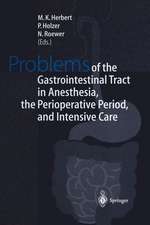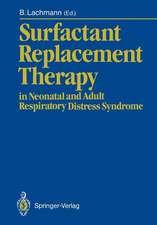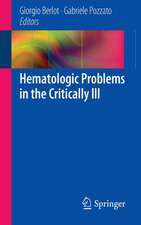The Stress Response of Critical Illness: Metabolic and Hormonal Aspects
Editat de Jean-Charles Preiseren Limba Engleză Hardback – 8 apr 2016
This book demonstrates how the latest insights into the physiopathology of the stress response can be integrated into clinical practice. The topic is particularly relevant since the metabolic changes triggered by acute stress, including adaptive responses such as resistance to anabolic signals, have recently been more precisely delineated. The underlying mechanisms of these changes are also now better understood. The authors analyse how these advances could result in better management and more effective prevention of the long-term clinical consequences of the alterations occurring during the acute phase. An international panel of respected experts discusses these topics and describes the management of some common clinical conditions.
| Toate formatele și edițiile | Preț | Express |
|---|---|---|
| Paperback (1) | 890.05 lei 38-44 zile | |
| Springer International Publishing – 25 apr 2018 | 890.05 lei 38-44 zile | |
| Hardback (1) | 724.50 lei 3-5 săpt. | |
| Springer International Publishing – 8 apr 2016 | 724.50 lei 3-5 săpt. |
Preț: 724.50 lei
Preț vechi: 762.64 lei
-5% Nou
Puncte Express: 1087
Preț estimativ în valută:
138.65€ • 143.93$ • 115.61£
138.65€ • 143.93$ • 115.61£
Carte disponibilă
Livrare economică 03-17 martie
Preluare comenzi: 021 569.72.76
Specificații
ISBN-13: 9783319276854
ISBN-10: 3319276859
Pagini: 269
Ilustrații: VIII, 245 p. 34 illus., 13 illus. in color.
Dimensiuni: 155 x 235 x 16 mm
Greutate: 0.64 kg
Ediția:1st ed. 2016
Editura: Springer International Publishing
Colecția Springer
Locul publicării:Cham, Switzerland
ISBN-10: 3319276859
Pagini: 269
Ilustrații: VIII, 245 p. 34 illus., 13 illus. in color.
Dimensiuni: 155 x 235 x 16 mm
Greutate: 0.64 kg
Ediția:1st ed. 2016
Editura: Springer International Publishing
Colecția Springer
Locul publicării:Cham, Switzerland
Public țintă
Professional/practitionerCuprins
Foreword.- Introduction.- Part 1: Metabolic changes.- Successive phases.- Bioenergetics of the stress response.- Hibernation and mitochondrial adaptation.- Resistance to anabolic signals.- Use of lipids as energy substrates.- Use of carbohydrates.- Stress hyperglycemia.- Protein metabolism.- Micronutrients.- Part 2: Hormonal regulation.- Hypothalamic-pituitary axis.- Thyroid.- Adrenal.- Sex hormones.- Enterohormones.- Adipokines.- Part 3: Particular clinical situations.- Severe undernutrition.- Traumatic brain injury.- Sepsis and MOF.- Morbid obesity.- Burn injury.
Recenzii
“The last decade has seen dramatic evolution in our understanding of the metabolic response to critical illness and its management. This book provides a summary of this work. Senior trainees in critical care or practitioners in high acuity units are an appropriate audience for this book, written by authors from Europe and North America. … This is a worthy summary of the recent work in metabolic and endocrine response to various insults.” (David J. Dries, Doody’s Book Reviews, July, 2016)
Notă biografică
Jean-Charles Preiser is currently Professor at the Department of Intensive Care of the Erasme University Hospital in Brussels. He has a long-lasting involvement in clinical research, in relation with the metabolic and nutritional aspects of critical illness. He published about 200 peer-reviewed articles, guidelines and book chapters. He is currently the associate editor of the Journal of Parenteral and Enteral Nutrition (JPEN), Critical Care and The Annals of Intensive Care and is actually involved in international and national education programs on nutrition.
Textul de pe ultima copertă
This book demonstrates how the latest insights into the physiopathology of the stress response can be integrated into clinical practice. The topic is particularly relevant since the metabolic changes triggered by acute stress, including adaptive responses such as resistance to anabolic signals, have recently been more precisely delineated. The underlying mechanisms of these changes are also now better understood. The authors analyse how these advances could result in better management and more effective prevention of the long-term clinical consequences of the alterations occurring during the acute phase. An international panel of respected experts discusses these topics and describes the management of some common clinical conditions.
Caracteristici
Provides both basic data and clinical applications for a translational approach Enables readers to prioritize future research Offers guidance for the metabolic and nutritional management of the critically ill Includes supplementary material: sn.pub/extras
